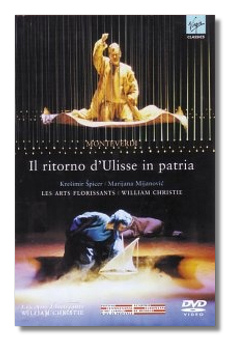
The Internet's Premier Classical Music Source
Related Links
- Monteverdi Reviews
- Latest Reviews
- More Reviews
-
By Composer
-
Collections
DVD & Blu-ray
Books
Concert Reviews
Articles/Interviews
Software
Audio
Search Amazon
Recommended Links
Site News
 DVD Review
DVD Review
Claudio Monteverdi

Il ritorno d'Ulisse in patria
- Krešimir Špicer (Ulisse)
- Marijana Mijanović (Penelope)
- Cyril Auvity (Telemaco)
- Joseph Cornwell (Eumete)
- Bertrand Bontoux (Antinoo)
- Andreas Gisler (Anfinomo)
- Christophe Laporte (Pisandro)
- Zachary Stains (Eurimaco)
- Katalin Károlyi (Melanto/Fortuna)
- Robert Burt (Iro)
- Geneviève Kaemmerlen (Ericlea)
- Rachid ben Abdeslam (L'Umana Fragilità)
- Olga Pitarch (Minerva/Amore)
- Paul-Henry Vila (Nettuno/Il Tempo)
- Eric Raffard (Giove)
- Rebecca Ockenden (Giunone)
Les Arts Florissants/William Christie
Virgin Classics 72434 90613-9 DVD 174min, plus 11-min bonus LPCM Stereo Dolby Digital
Ulisse was one of the first operas to be written for the public stage, not for royalty. Monteverdi was in his seventies when he wrote it, yet it is a work of intense and youthful passion, as well as wisdom. At nearly three hours (in this version, anyway), it demands a lot from its audience, and seeing it at home via DVD is a great way to make its acquaintance.
This production dates from 2000; this particular live performance was recorded in the fairly intimate Théâtre de Jeu de Palme in 2002. The production is simple but eloquent. Essentially, there is one set, but it is made to do a lot of work through varied lighting, props, and so on. The young cast scampers over and around it like sailors on a tall ship.
Christie selected the cast members for their looks and acting abilities, as well as for their singing voices. Indeed, there is not a single name in the cast list that was familiar to me. Early on, it becomes clear that Christie chose well. Operatic voices are not required for Monteverdi. Instead, singers must have a grasp on period style and refined vocal expression. Planting one's feet and letting the sound rip is not going to work in Ulisse. The line between singing actors and acting singers becomes happily blurred.
An earlier DVD of this opera featured the work of Nikolaus Harnoncourt, and, in the central role of Penelope, mezzo-soprano Vessalina Kasarova. That DVD was a knockout, but this is one is no less fine. Here, Penelope is sung by the heron-like Marijana Mijanović, a visually striking study in vertical lines. Ulysses is the burly but tender Krešimir Špicer, who convincingly pretends to be an aged beggar throughout most of the opera. All of the cast members are notable in one way or another, but special kudos are deserved by Cyril Auvity (as Telemachus, Ulysses's and Penelope's son), and Olga Pitarch, in the dual roles of Minerva (the goddess who arranges the hero's return to his homeland) and Love. Robert Burt combines pathos and humor as Irus, the gluttonous blowhard who hopes to profit from Penelope's remarriage. (After the suitors are killed by Ulysses, he commits suicide for fear of going hungry.) As in Harnoncourt's version, Christie favors a richer complement of instruments than was the style in "authentic" performances from the 1960s.
Choosing between Harnoncourt and Christie is difficult. The former version is more operatically sung, more opulent, and more immediately engaging. Christie's, on the other hand, feels purer and closer not just to the spirit of Monteverdi, but to Homer as well. (It is a bit longer as well.) Kasarova and Mijanović both are goddesses, to my mind. Christie's cast is probably the more sympathetic of the two, but I could live with either.
An eleven-minute interview with Christie is a nice bonus to an already generous DVD. Optional subtitling is in Italian, English, French, and Spanish. As with the Harnoncourt DVD, the sound is either LPCM Stereo or Dolby digital 5.1, and the picture ratio is 16:9. The sound on the Harnoncourt DVD is a little more brilliant, but this is not an important difference.
Copyright © 2004, Raymond Tuttle


















